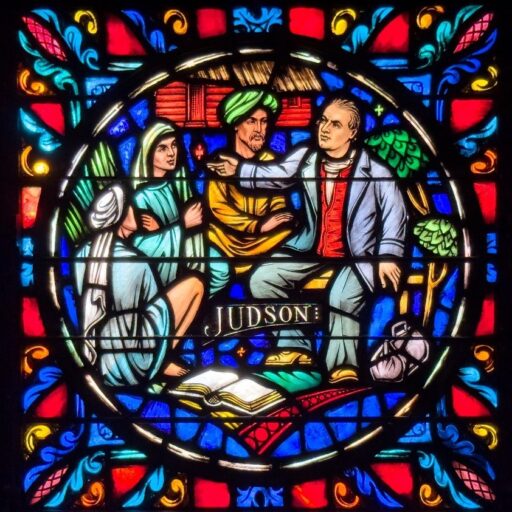1875-1943
Adoniram Judson Tuttle
Baptist Missionary Ohio/India
Adoniram Judson Tuttle was born May 18, 1875 near Springfield, Ohio, and was baptized twelve years later at Sinking Creek Baptist Church. He graduated from Denison University 1896, attended the University of Chicago the next year, and finished his professional degree at Crozer Seminary in 1900. Later that same year, the Washington Court House Baptist Church in Ohio ordained him to the gospel ministry. In 1926 Tuttle was honored with a Doctor of Divinity degree from Denison. He married Frances Kemble Davidson (1876-1946) on July 29, 1901, and together they had a daughter and a son.
Rev. and Mrs. A. J. Tuttle sailed for India on September 18, 1901, to begin a missionary career that would last 40 years in the northeastern state of Assam. In 1913 the mission tried an experiment by uniting all their language missionaries under one unit and selecting a Mission Secretary who would be responsible for coordination, communication, and management. The first Mission Secretary for the Assam Mission was Adoniram Judson Tuttle. A review of his 1915 report will reveal how he worked in managing this first-of-its-kind system.

Your Secretary has not by any means come to the conclusion that he knows all about the Assam Mission and he feels sure that you will not debate this position. In the course of his visits to the stations he feels that he has learned some things, but does not feel that he knows all about them or that he is infallible in what he thinks he knows.
- I. Year’s Work: Since the time that the Board of Managers indicated their approval of the new office, your Secretary has traveled some 3, 754 miles in visiting stations in our mission, although all have not yet been seen, while others have been visited more than once. Of these 3,754 miles, 2625 have been by rail; 519 by cart road, bridle path, and foot path; 318 by steamer and motor boat; 252 by motor car, and 40 by native boat….
VII. Evangelistic Campaign. The attention of the Conference members is called to this and we hope that all may do as much as possible in this special effort. The time may come when we should set apart one of our number for itinerary evangelistic work as has been done in Burma….
IX. We cannot well spare missionaries to prepare literatures in the many languages in which we work. My own hope at present is that we may use Assamese in the whole of the Valley from the Goalpara District up and also for the hills surrounding—excepting the Garo Hills—and soon set apart one of our number to devote a large part of his time to the preparation of this literature. We should give this matter the earliest possible attention….
XI. Reinforcements…. The men missionaries on the field for the period from 1914 to 1920 gradually decreases from 26 in 1914 to 21 ½ in 1920, and one year drop as low as 20 ¾. The Woman’s Society workers vary from 6 ½ in 1914 to 8 in 1920, dropping during 1916, 1917, and 1918 to 5 ¾…. the differences in language makes it impossible to transfer workers readily from one field to another….
XIII. Educational Scheme for our Mission, especially for all sections outside of the Garo Hills…. (c) As a general scheme may it not be possible to have all our education in the Naga Hills and all of the Plains lead up to Jorhat? Let us have village schools and in some cases the station schools, either as evangelistic schools or for training primary teachers; then the Middle, High, Industrial, and Bible Schools at Jorhat. For those wishing to pursue their literary work further we have the splendid Government College at Gauhati with five European professors, and hope to have arrangement whereby our Christian students can pursue their college course while living in the wholesome surroundings provided in the Hostel on the Mission Compound at Gauhati.[1]
One hundred years after Adoniram Judson, Jr. arrived in Burma, Adoniram Judson Tuttle was elected to be the first Mission Secretary of the Assam Mission in Northeast India. A century later this author visited the compound in Gauhati on the banks of the Brahmaputra River and stayed “in the wholesome surroundings provided in the Hostel on the Mission Compound.” Many of the projects Tuttle envisioned have become reality. The American Baptist missionaries have deeded the compound to the Council of Baptist Churches in North East India (CBCNEI) and these ministries are ably led by Dr. Akheto Sema. The CBCNEI continues to dream of new ministries even launching North East Christian University in 2018.
Twice in Tuttle’s first report of 1915, he harkened back to how the work was done in Burma acknowledging the influence of his namesake. In colonial India “the Kaiser-i-Hind medal might be earned by any person without distinction of race, occupation, position, or sex … who shall have distinguished himself (or herself) by important and useful service in the advancement of the public interest in British Raj.”[2] Dr. Adoniram Judson Tuttle received this award in 1928 from the government of Great Britain and India for his distinguished service in education.
Dr. Adoniram Judson Tuttle died in 1943 in Arlington, Massachusetts.
+++++++++++++++
[1] Assam Baptist Missionary Conference of the American Baptist Foreign Mission Society REPORT on the Thirteenth Session Held in Golaghat, January 9-18, 1915 (Calcutta: Baptist Mission Press, 1915), pp. 56, 63, 64-65, 67.
[2] Kaisar-i-Hind Medal – Wikipedia
